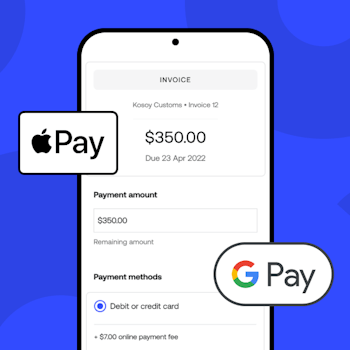
How to plan a vacation as a freelancer or small business owner (and not worry about time off)
As a freelancer or small business owner, have you ever questioned whether taking time off is worth it because the stress of preparing for a vacation is so high? If so, you’re not alone.
Taking a vacation and having a good work-life balance is not a luxury! For entrepreneurs, small business owners, and freelancers, it’s a necessity. 100%. Yet according to Inc. magazine, many business owners only take one week off per year — but it should be closer to four.
And why is that, exactly? Well, when you consider that American workers (that includes small business owners) work anywhere from 60 to 72 hours per week on average, per the Center for Creative Leadership, it’s easy to recognize it for what it is: unsustainable.
One week is barely enough to take a breather. When you finally do find some separation between the day-to-day and your true self, it’s time to get back to work. A vacation is supposed to help you relax, rejuvenate, and refresh, but that’s only possible if you can step away completely, stop worrying about what’s going on back at the office, and focus on yourself for a little while. In other words, a little R&R is nothing to feel guilty about.
You are a real person, after all. You had a life before you started your business. Lose sight of your identity, and an existential crisis is never far off.
The many benefits of time off
Regardless of how much you love what you do, stepping away periodically is essential. A little free time helps you gain perspective and energizes you for what’s to come. Solutions come to you more easily when you loosen your grip on projects and deadlines.
Even if you take vacations periodically, it’s probably not as much as you need. Ideally, you’d take a weeklong vacation every quarter, or every three months. (In short, the occasional mental health day just won’t cut it.)
Time off enables you to:
- Reset your mind and protect your mental health. When you’re laser-focused on the day-to-day, it’s challenging to see paths to business growth. A little distance allows you to let go of the stress of daily tasks so the bigger picture can take shape on its own.
- Rest your body and protect your physical health. Whether you’re working 50, 60, or 72 hours per week, that pace takes its toll on your body. Increased stress builds up cortisol in your system, which can lead to numerous physical and mental health issues, including chronic inflammation, increased blood pressure, anxiety, and more.
- Live in the moment. Life is for living, ya know. But without diving down a philosophical rabbit hole, consider this. When you take time away from your business, it helps you appreciate why you work so hard and do what you do. Your family, friends, and the things you love are so meaningful — and your work facilitates all of it. Whether you’re planning for your kids’ futures or building a legacy in other ways, it’s hard to see the forest for the trees when you’re constantly focused on work. You started your business for a reason. Take some time to enjoy those reasons and remind yourself how precious they are.
- Give your employees space to step up. You might be the heart and soul of your business, but your employees are surely capable of holding down the fort. Encourage teams to take the lead every now and then. Not only will it build their confidence, it might even help you relax a bit more, knowing matters are in good hands.
There are so many reasons you need to be able to hand off operations to staff, but one of the most significant is the value of the business itself. If you ever plan to sell your business or take on partners, strong managers who can carry on in your absence is imperative. You’ll never know how good your team really is unless you give them space to shine.
- Improve company culture. Seeing you routinely take time away from the office might encourage employees to enjoy paid time off, too. Over the long term, you’ll create a company culture that prioritizes your employees’ mental health, self care, and overall well being, not just their output.
How to plan your vacation days without worrying
Now that we know why time off is a good idea for business owners, freelancers, and entrepreneurs, let’s talk about how to plan it.
Here are seven actionable tips on how to plan a vacation without worrying about what will happen while you’re away.
1. Plan your vacation time during the slow season
Time away might never be convenient. However, planning a vacation around slower times of the year will make it possible. Service industries usually see a significant lull in January and February post-holiday surge, but that may or may not be accurate for you. Plus, your slow months might not be the best times to travel, depending on where you like to go. You’ve got many variables to consider, including your kids’ school vacations, your partner’s ability to get paid time off, or even something as simple as the weather at your destination.
If it sounds complicated — and we know it can be — let’s revisit what we mentioned in the previous section about allowing your employees to step up. While you don’t want to bail when the pressure’s on, a strong team can carry the load.
Think about it: if something were to happen and you had to take time off, wouldn’t you want a solid team to step in for you? Train your people well, and give them a chance to show you what they can do.
Not sure when the best time for a vacation might be? If you use Invoice2go reports, you can easily see your busiest and slowest months to help you plan. Historical data usually illuminates patterns, so take advantage of our visual reporting options to get answers at-a-glance.
2. Set boundaries for yourself and protect your mental health
Once you’ve set aside your vacation time and booked your trip, you need to lay down some ground rules. Time away is not a vacation unless you can truly disconnect. Of course, the level of disconnect depends on how strong your home team is and who’s stepping in. The bottom line: There are still boundaries you can set. Your employees shouldn’t have unlimited access to you.
Decide before you leave how much contact you want or need to have. If you must check in periodically, how will you do it? Will you be checking emails every morning? Do you need to schedule a Slack check-in every couple of days? If you will only respond to emergencies, how will news of them reach you? Whatever you decide, it’s critical to spell it out before leaving so there is no ambiguity.
Do yourself a favor and set some time limits for check-ins, too, as we all know how easy it is to get sucked into the black hole. Ultimately, you don’t want to leave yourself feeling anxious about anything, so devise a plan that makes sense for your mental health and well being.
3. Delegate judiciously
Planning well is the best way to alleviate any anxiety about what’s to be done while you’re taking time off. Go through your daily tasks. Can you reasonably expect one person to handle everything? Are there items that can wait until you get back? Or does it make more sense to distribute the tasks to various people? Speak to each of your employees individually to ensure they understand the expectations.
Things that are not time-sensitive can wait. Just be sure that anyone responsible for the task knows your plans.
You might also consider delegating to staff as test runs for future vacations. Choose low-risk projects or pull out a few things you’ve had on the back burner to see how they do. A strong performance might make you feel less apprehensive about leaving them in charge during your next vacation.
4. Prepare your employees for any issues that might come up
As a business owner, you can likely foresee any possible “what-if” scenarios. When you’re planning your vacation, it’s vital to think about what could transpire while you’re gone so you can prepare your employees just in case. Even if you feel the potential for problems is slim to none, it’s always better to be prepared.
Go over projects that’ll come due during your time away. Consider the clients — are there any who tend to be difficult or high-maintenance? If so, assign a key point of contact to handle their account. Brief them well on what might occur and give them detailed instructions on managing the client.
When all stakeholders know how issues should be handled, it imbues the whole business with confidence. Take the time to brief your managers or department heads on how to handle things in your absence, and ensure all employees understand the chain of command if a matter needs to be kicked up the ladder.
5. Let your customers know you’ll be away
Not all clients will respect your boundaries. But if you do your best to inform them that you’ll be away and unavailable, you’ll at least have a recourse. Let them know well in advance when you’ll be out of the office. Discuss projects in progress and make alternate arrangements when needed. They’ll appreciate your transparency, and hopefully, they’ll respect how hard you work and that you deserve time off.
Giving your clients advance notice of your vacation is also a way to show them how much you value their time and business. By making an effort to accommodate their needs and address any concerns they have in advance, you’ll sow a lot of goodwill. Let them know who they can speak to in your absence, and make a direct introduction if you feel it’s necessary. They need to know they’ll be well taken care of while you’re gone and that you always have their best interests at heart.
6. Assign someone else to be “you” for urgent matters
Many businesses fall into the trap of not having a second-in-command. You must have someone in the organization who can make decisions and judgment calls, or sign checks on your behalf.
Ensure it’s someone you trust. It could be your bookkeeper, a manager, or a family member, but whoever you appoint, it should be someone who isn’t afraid to say no, who can act as you would, and who understands your interests and those of the business. They should also be someone who gets along with your employees and with whom there is little controversy. You want to make sure people respect their decisions, and avoiding friction is the best way to accomplish this.
Once you’ve decided who your gatekeeper will be, make sure everyone else knows. Otherwise, you might receive unnecessary communication around “who’s in charge” and “why is this happening.”
7. Don’t forget to enjoy yourself!
You spend a lot of time and heart building your business and taking care of your employees, but you need to focus at least the same level of effort on yourself. There’s an old saying that goes, “in order to nourish others, you must first nourish yourself.”
It makes sense. With the hours you put in, burnout is inevitable. If you’re burned out, you can’t possibly give your all to the cause, which means you’re not only robbing yourself of the chance to enjoy the one life you have, but you’re also doing your business — and the people who work for you — an injustice. The need for rest is a valid reason for taking time off.
When you return from your vacation, you’ll feel renewed and ready to take on the world — and if you’ve empowered the right employees to step up in your absence, you’ll have also boosted the value of your business. It’s a win-win.
Related Articles

How to accept credit card payments on Invoice2go in 3 simple steps

Accept payments online via Apple Pay and Google Pay

Must-not-miss write-offs as you wrap up 2022 year-end finances

5 ways accepting credit and debit card payments helps your business stay resilient

4 easy ways to increase cash flow today

What is Small Business Saturday and why is it important?
The features and surprising benefits of a well-designed packing slip
